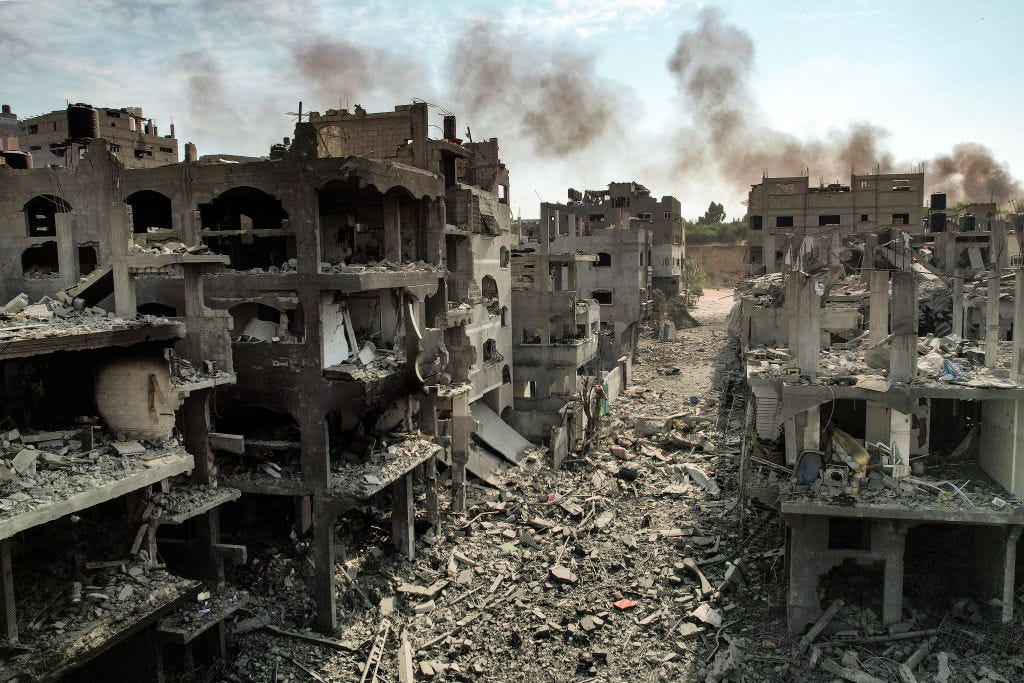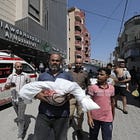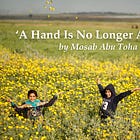A Year of Living Among Genocide Apologists
Diana Buttu on what life in Israel has been like since Oct. 7, 2023.
Subscribers can now listen to Diana’s essay in her own words through the ‘listen to post’ button above.

One year. I cannot believe that it has been one year. One year of witnessing Palestinians try to retrieve mangled bodies from the sites of Israeli bombs – whether they be homes, hospitals, schools, universities, mosques, or even tents. One year of seeing children scream in fear, in physical pain, in emotional pain, knowing that the world is and always will be cruel. One year of watching one of the most vibrant Palestinian cities, Gaza City, turned into rubble. One year of worrying about friends and futures. One year of explaining over and over again that Palestinians deserve to live and to be free; that Oct. 7 is the result of decades of Israeli brutality and oppression; and that nothing – absolutely nothing – justifies genocide.
Yet, Israeli society has been drunk on perpetrating crimes. Unlike in the West, where Israelis try to portray themselves as victims, in Israel, the image is the exact opposite: that of strong, undefeatable soldiers who assert their superiority over Palestinians. This is what explains the many TikToks proudly showing Israeli soldiers blowing up Palestinian universities and homes. This is what explains the desire to show them torturing Palestinians and the endless videos of Israelis dressed in hijab and with dirt on their faces mocking Palestinian women and children who have survived Israel’s relentless bombs. Israel is the place where superiority (and cruelty) is on full display.
Throughout the past year, I have been asked what it is like to live in Haifa, among Israelis. Thinking about my answer, I find myself thinking about my parents, who were both born before the Nakba but were raised in Nazareth, a city that was taken over and became part of Israel. I find myself thinking about my late father, and what it was like for him to live among the very people who perpetrated the Nakba, who were apologists for the Nakba, or who denied the Nakba. I find myself thinking about how invisible Palestinians were then – and now – to Israelis, how dehumanized we were then and now. I think about the ways my parents – and the 150,000 other Palestinians who remained in what became Israel – maneuvered their fragile existence among the criminals and their cheerleaders. Their homeland was sacrificed and transformed into a large Israeli military base, while their bodies became the repositories of Israeli cruelty. Israeli policies are premised on the idea that what cannot be achieved through force can only be achieved through more force.
I think about this because that pattern of invisibility and disregard for Palestinian lives continues to this very day, including in Haifa. It is part of the ethos of the state. Today, as Israel makes daily raids on Palestinian cities and towns, imprisoning (and, of course, torturing) thousands, destroying homes, and tearing up cities with bulldozers, Israel’s cruelty and short-sightedness are on full display. As Israelis discuss why all Hamas leaders have not yet been assassinated (as though that were legal), toast one another on TV after Hezbollah leader, Hassan Nasrallah’s assassination, and joke about blowing people up during Israel’s pager attack, little thought, if any, is given to any of the consequences of such actions. For them, the flattening of six buildings in Beirut, the killing of about 2,000 Lebanese people over the past month, and the killing of tens of thousands of Palestinians mean absolutely nothing. There are no major protests demanding that Israel stop the genocide; just protests (which have all but completely died down) demanding that Israel strike a deal to bring back the Israeli captives.
As an example of what it is like to live in Israel, one only needs to look to the experience of a 12-year-old girl.
While in a class discussion, the seventh-grader said that small children were starving and suffering in Gaza. In response, dozens (if not hundreds) of students from her school formed a mob, screaming and dancing one of Israel’s most known chants: “May your village burn!” (of course, posted on TikTok). She was suspended from school; her tormentors were not.
Israel’s so-called “democratic institutions” are equally complicit. In late September, Israel’s highest court approved the continued detention of Walid Daqqah’s dead body. Yes, dead body. Walid was a 62-year-old Palestinian political prisoner – a Palestinian citizen of Israel – who spent 37 years in prison. He suffered from a rare form of cancer, and though he was supposed to be released in March 2023, Israeli authorities, tacked on an additional two years to his prison term. For the last six months of his life, Walid was tortured, beaten, and denied medical treatment. He was denied the ability to speak to his wife and his 4-year-old daughter (who only ever met him once). On April 7, Walid died, and Israeli authorities have held his body ever since, denying his family the right to bury him. In its ruling, the court said that Walid’s body could be used as a political bargaining chip like the other Palestinian bodies that Israel has refused to hand over and the thousands of Palestinians illegally held hostage in Israeli prisons.
I expect no less from the state or from Israelis. In fact, the only way that the Nakba could have been carried out and this decades-long occupation justified is through the wholesale dehumanization and demonization of Palestinians. How else can one justify stealing the homes and lands of another? How else can one justify genocide and ethnic cleansing?
Today, Israelis are on a demonic high after Nasrallah’s assassination and after a year of genocide. Israelis are now advertising for the purchase of homes in southern Lebanon and offering boat tours to view the destruction in Gaza (with potential sites for construction pointed out, of course). None of this would have been possible without the impunity that the West, particularly the “axis of genocide” – Israel, the US, and Western Europe – has given Israel.
As we mark one year since the start of this genocide, the only message that Israelis will take away from this year is that Palestinians truly are invisible – not only to them but to the rest of the world. Genocide and torture are permissible (in fact, they can be cool and fun!), and blowing up buildings is a great way to build up a social media presence. Palestinian bodies are made to have the latest Israeli technology used on them or to be political bargaining chips, with the stamp of approval from Israel’s courts. Just as my parents had to endure the criminals of the Nakba, the Nakba deniers and apologists, so too Palestinians today endure the same. So you ask me, what is it like to live in Haifa among these people? I will let you decide.
Read more of Zeteo’s special content marking Oct. 7:









Diana, that was as beautiful as it was haunting. Thank you for writing this. It was the first time I’ve heard the term “Axis of Genocide” to describe the perpetrators and their backers; what I would give to have that become part of the mainstream conversation.
Please stay safe, and thank you for your work.
This podcast was amazing and terrifying and just plain sad. But it reminds me of a trip to Israel back in the 90s in which my life totally changed. What I will never forget is how many brave and incredible Palestinians I met and how they struggled in a land that is anything but peaceful. I also will never forget how victims can easily become victimizers. For too long, the United States has had an out of balance look at Israel. It took actually being there to see and hear many different sides.